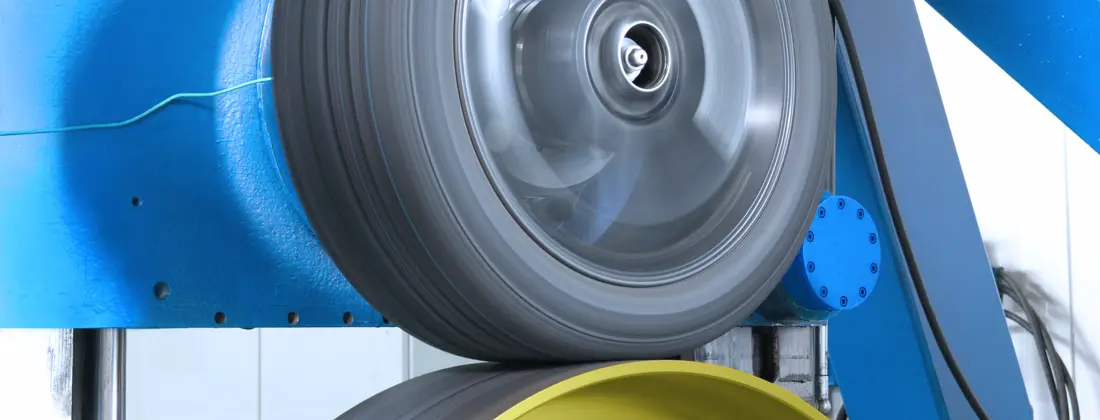INMETRO 545 Tyre Rolling Resistance Test Brazil
The INMETRO 545 tyre rolling resistance test is a critical measurement in the Brazilian market, ensuring that tyres meet stringent environmental and safety standards. This test evaluates the energy loss during tyre rolling, which directly impacts fuel efficiency and overall performance. The test follows the ISO 6980 standard for rolling resistance of pneumatic tyres, with additional considerations as per INMETRO requirements. This ensures that tyres are not only environmentally friendly but also safe and reliable.
The rolling resistance coefficient (CR) is a key metric in this test. It represents the ratio of the force required to roll the tyre at a constant speed on a flat surface to the weight of the tyre. A lower CR indicates better fuel efficiency, which is crucial for reducing greenhouse gas emissions. This test is particularly important for original equipment manufacturers (OEMs) and tyre retailers looking to comply with Brazilian regulations.
The INMETRO 545 test requires tyres to be tested under controlled conditions that simulate real-world driving scenarios. The testing apparatus used includes a rolling resistance tester, which consists of a steel wheel mounted on an electrically driven carriage. The tyres are inflated to their nominal pressure and placed on the rotating drum at specified speeds. The force required to maintain this speed is measured and converted into the CR value.
The test procedure involves several steps:
- Preparation of the tyre, including cleaning and drying.
- Inflation to the required pressure.
- Mounting on the rolling resistance tester.
- Rotation at specified speeds while measuring force.
- Data collection and analysis.
The results are compared against INMETRO standards, which are stricter than those in other markets. Compliance with these standards ensures that tyres meet not only local regulations but also international expectations for sustainability and performance.
| Key Parameters | Description |
|---|---|
| Test Speed | Typically 5 km/h or 10 km/h, depending on tyre size and INMETRO requirements. |
| Load Application | The tyre is loaded to its nominal load before testing. |
| Temperatures | Temperature ranges from room temperature up to 35°C, depending on the test protocol. |
| Environmental Conditions | Testing occurs in controlled environmental chambers to ensure uniformity. |
The INMETRO certification is a significant milestone for tyre manufacturers. It not only ensures compliance with local regulations but also enhances the reputation of the manufacturer in the Brazilian market. This test is essential for companies looking to enter or expand their presence in Brazil, as it ensures that their products meet the highest standards of safety and environmental responsibility.
Industry Applications
The INMETRO 545 tyre rolling resistance test has widespread applications across various sectors within the automotive industry. Here are some key areas where this testing plays a crucial role:
- OEMs and Tier 1 Suppliers: Ensuring that all tyres used in their vehicles meet strict environmental standards.
- Tyre Retailers: Offering customers eco-friendly options that contribute to lower fuel consumption.
- Government Agencies: Monitoring tyre performance across the country to enforce compliance with INMETRO regulations.
- Research and Development (R&D): Developing new tyre technologies that minimize rolling resistance while maintaining safety and durability.
The test results are particularly important for OEMs and Tier 1 suppliers, as they ensure that the tyres used in their vehicles meet not only INMETRO requirements but also international standards. This helps to build trust with consumers, who increasingly value sustainable products. For tyre retailers, compliance with these standards ensures that they can offer eco-friendly options that appeal to environmentally conscious customers.
Government agencies use this test to monitor tyre performance across the country. By ensuring compliance with INMETRO regulations, they contribute to reducing fuel consumption and greenhouse gas emissions nationwide. R&D teams benefit from the test by using it as a benchmark for developing new technologies that reduce rolling resistance while maintaining or improving safety.
Eurolab Advantages
Eurolab offers comprehensive INMETRO 545 tyre rolling resistance testing services, providing clients with unparalleled expertise and precision. Our state-of-the-art facilities are equipped with the latest technology, ensuring that our tests meet the highest standards of accuracy and reliability.
- ISO/IEC 17025 Accreditation: Ensures that our laboratory adheres to strict quality management practices.
- Experienced Technicians: Our team comprises highly skilled professionals with extensive experience in tyre testing.
- Comprehensive Reporting: We provide detailed reports that include all test parameters, ensuring complete transparency and traceability.
- Fast Turnaround Times: Our efficient processes allow for quick turnaround times without compromising on quality.
Our commitment to quality is further demonstrated by our adherence to international standards such as ISO 6980. This ensures that the results of our tests are internationally recognized and accepted. Eurolab’s reputation for reliability and accuracy has made us a preferred choice among OEMs, Tier 1 suppliers, tyre retailers, and government agencies.
Customer Impact and Satisfaction
By choosing Eurolab for INMETRO 545 tyre rolling resistance testing, our customers benefit from a range of positive outcomes. Our services have significantly impacted the performance and reputation of various companies in the automotive sector.
- Increase in Compliance: Ensuring that tyres meet strict environmental standards, thereby facilitating easier market entry.
- Enhanced Reputation: Building trust with consumers who value sustainable products.
- Improved Product Quality: Providing data-driven insights for R&D teams to improve tyre performance and safety.
- Cost Savings: Reducing the need for repeated testing by ensuring first-time compliance.
The positive impact of our services extends beyond individual companies. By ensuring that tyres meet stringent standards, we contribute to reducing fuel consumption and greenhouse gas emissions nationwide. This aligns with broader environmental goals and enhances public perception of the automotive industry as a whole.





